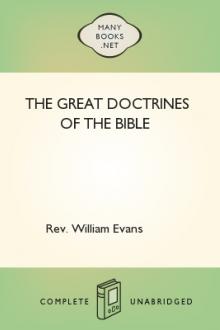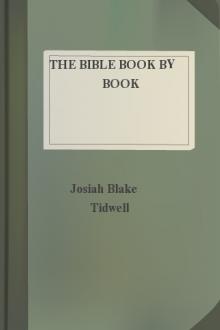The Great Doctrines of the Bible by Rev. William Evans (best books to read for self improvement TXT) 📖

- Author: Rev. William Evans
- Performer: -
Book online «The Great Doctrines of the Bible by Rev. William Evans (best books to read for self improvement TXT) 📖». Author Rev. William Evans
b) The Spirit Indwells the Believer.
1 Cor. 6:19—“Your body is the temple of the Holy Ghost which is in you.” Also 3:16; Rom. 8:9. Every believer, no matter how weak and imperfect he may be, or how immature his Christian experience, still has the indwelling of the Spirit. Acts 19:2 does not contradict this statement. Evidently some miraculous outpouring of the Spirit is intended there, the which followed the prayer and laying on of the hands of the apostles. “Now if any man have not the Spirit of Christ, he is none of his.” “No man can say that Jesus is the Lord, but by the Holy Ghost” (Rom. 8:9; 1 Cor. 12:3).
c) The Spirit Seals the Believer with Assurance of Salvation.
Eph. 1:13, 14—“In whom also after that ye believed, ye were sealed with that Holy Spirit of promise; which is the earnest of our inheritance.” Also 4:30—“Sealed unto the day of redemption.” This sealing stands for two things: ownership and likeness (2 Tim. 2:19-21). The Holy Spirit is “the Spirit of adoption” which God puts into our hearts, by which we know that we are His children. The Spirit bears witness to this great truth (Gal. 4:6; Rom. 8:14, 16). This sealing has to do with the heart and the conscience—satisfying both as to the settlement of the sin and sonship question.
d) The Holy Spirit Infills the Believer.
Acts 2:4—“And they were all filled with the Holy Ghost.” Eph. 5:18—“Be filled with the Spirit.” The filling differs somewhat from the indwelling. We may speak of the baptism of the Spirit as that initial act of the Spirit by which, at the moment of our regeneration, we are baptized by the Spirit into the body of Christ; the Spirit then comes and takes up His dwelling within the believer. The filling with the Spirit, however, is not confined to one experience, or to any one point of time exclusively; it may be repeated times without number. There is one baptism, but many infillings with the Spirit. The experience of the apostles in the Acts bears witness to the fact that they were repeatedly filled with the Spirit. Whenever a new emergency arose they sought a fresh infilling with the Spirit (cf. Acts 2:4 with 4:31 showing that the apostles who were filled on the day of Pentecost were again filled a few days after).
There is a difference between possessing the Spirit, and being filled with the Spirit. All Christians have the first; not all have the second, although all may have. Eph. 4:30 speaks of believers as being “sealed,” whereas 5:18 commands those same believers to “be filled (to be being filled again and again) with the Spirit.”
Both the baptism and the infilling may take place at once. There need be no long wilderness experience in the life of the believer. It is the will of God that we should be filled (or, if you prefer the expression, “be baptized”) with the Spirit at the moment of conversion, and remain filled all the time. Whenever we are called upon for any special service, or for any new emergency, we should seek a fresh infilling of the Spirit, either for life or service, as the case may be.
The Holy Spirit seeks—so we learn from the story of the Acts—for men who are not merely possessed by but also filled with the Spirit, for service (6:3, 5; 9:17; 11:24). Possession touches assurance; infilling, service.
e) The Holy Spirit Empowers the Believer for Life and Service.
Rom. 8:2—“For the law of the Spirit of life in Christ Jesus hath made me free from the law of sin and death” (also vv. 9-11). There are two natures in the believer: the flesh and the Spirit (Gal. 5:17). But while the believer is still in the flesh, he does not live after the flesh (Rom. 8:12, 13). The Holy Spirit enables the believer to get constant and continual victory over sin. A single act of sin a believer may commit; to live in a state of sin is impossible for him, for the Spirit which is within him gives him victory, so that sin does not reign over him. If sinless perfection is not a Scriptural doctrine, sinful imperfection is certainly less Scriptural. The eighth chapter of Romans exhibits a victorious life for the believer; a life so different from that depicted in the seventh chapter. And the difference lies in the fact that the Holy Spirit is hardly, if at all, mentioned in the seventh chapter, while in the eighth He is mentioned over twelve times. The Spirit in the heart is the secret of victory over sin.
Then note how the Holy Spirit produces the blessed fruit of the Christian life (Gal. 5:22, 23). What a beautiful cluster of graces! How different from the awful catalogue of the works of the flesh (vv. 19-21). Look at this cluster of fruit. There are three groups: the first, in relation to God—love, joy, peace; the second, in relation to our fellowman—longsuffering, gentleness, goodness; the third, for our individual Christian life—faith, meekness, self-control.
f) The Holy Spirit is the Guide of the Believer’s Life.
He guides him as to the details of his daily life, Rom. 8:14; Gal. 5:16, 25-“Walk in the Spirit.” There is no detail of the believer’s life that may not be under the control and direction of the Spirit. “The steps (and, as one has well said,‘the stops’) of a good man are ordered by the Lord.”
The Holy Spirit guides the believer as to the field in which he should labor. How definitely this truth is taught in the Acts 8:27-29; 16:6, 7; 13:2-4. What a prominent part the Spirit played in selecting the fields of labor for the apostles! Every step in the missionary activity of the early church seemed to be under the direct guidance of the Spirit.
g) The Holy Spirit Anoints the Believer.
This anointing stands for three things:
First, for knowledge and teaching. 1 John 2:27—“But the anointing which ye have received of him abideth in you, and ye need not that any man teach you; but as the same anointing teacheth you of all things, and is truth … ye shall abide in him.” Also 2:20. It is not enough to learn the truth from human teachers, we must listen to the teaching of the Spirit. 1 Cor. 2:9-14 teaches us that there are some great truths that are spiritually discerned; they cannot be understood saving by the Spirit-filled man, for they are “spiritually discerned.” See also John 14:26; 16:13.
Second, for service. How dependent Christ was upon the Holy Spirit for power in which to perform the duties of life is clear from such passages as Luke 4:18—“The Spirit of the Lord is upon me, because he hath anointed me to preach,” etc. Also Acts 10:38—“How God anointed Jesus of Nazareth with the Holy Ghost and with power: who went about doing good.” Ezekiel teaches a lesson by his vivid picture of the activity of God portrayed in the wheels within wheels. The moving power within those wheels was the Spirit of God. So in all our activity for God we must have the Spirit of power.
Third, for consecration. Three classes of persons in the Old Testament were anointed: the prophet, the priest, and the king. The result of anointing was consecration—“Thy vows are upon me, O God”; knowledge of God and His will—“Ye know all things”; influence—fragrance from the ointment. Just as the incense at Mecca clings to the pilgrim when he passes through the streets, so it is with him who has the anointing of the Spirit. All his garments smell of myrrh, and aloes, and cassia. He has about him the sweet odor and scent of the Rose of Sharon and the Lily of the Valley.
3. THE RELATION OF THE HOLY SPIRIT TO THE SCRIPTURES.
a) He is the Author of the Scriptures.
Holy men of God spake as they were moved by the Holy Spirit. 2 Pet. 1:20, 21. The Scriptures came by the inbreathing of God, 2 Tim. 3:16. “Hear what the Spirit saith to the churches,” Eev. 2 and 3. It was the Spirit who was to guide the apostles into all the truth, and show them things to come (John 16:13).
b) The Spirit is also the Interpreter of the Scriptures.
1 Cor. 2:9-14. He is “the Spirit of wisdom and revelation,” Eph. 1:17. “He shall receive of mine and show it unto you,” John 16:14, 15. (See under the Inspiration of the Bible, p. 194.)
4. THE RELATION OF THE HOLY SPIRIT TO JESUS CHRIST.
How dependent Jesus Christ was, in His state of humiliation, on the Holy Spirit! If He needed to depend solely upon the Spirit can we afford to do less?
a) He was Conceived by the Holy Spirit, born of the Spirit, Luke
1:35.
b) He was led by the Spirit, Matt. 4:1.
c) He was Anointed by the Spirit for Service, Acts 10:38.
d) He was Crucified in the Power of the Spirit, Heb. 9:14.
e) He was Raised by the Power of the Spirit, Rom. 1:4; 8:11.
f) He gave Commandment to His Disciples and Church Through the Spirit, Acts 1:2.
g) He is the Bestower of the Holy Spirit, Acts 2:33.
V. OFFENCES AGAINST THE HOLY SPIRIT.
Scarcely any phase of the doctrine of the Spirit is more solemn than this. It behooves us all, believer and unbeliever alike, to be careful as to how we treat the Holy Spirit. Sinning against the Spirit is fraught with terrific consequences.
For convenience sake we are classifying the offences against the Spirit under two general divisions, namely, those committed by the unbeliever, and those committed by the believer. Not that there is absolutely no overlapping in either case. For, doubtless, in the very nature of the case there must be. This thought will be kept in mind in the study of the offences against the Spirit.
1. OFFENCES COMMITTED BY THE UNBELIEVER.
a) Resisting the Holy Ghost.
Acts 7:51-“Ye do always resist the Holy Ghost.” Here the picture is that of the Holy Spirit attacking the citadel of the soul of man, who violently resists the gracious attempts of the Spirit to win him. In spite of the plainest arguments, and the most incontestable facts this man wilfully rejects the evidence and refuses to accept the Christ so convincingly presented. Thus is the Holy Ghost resisted. (See Acts 6:10.) That this is a true picture of resistance to the Holy Spirit is clearly seen from Stephen’s recital of the facts in Acts 7:51-57.
b) Insulting, or Doing Despite unto the Holy Spirit.
Heb. 10:29 (cf. Luke 18:32). It is the work of the Spirit to present the atoning work of Christ to the sinner as the ground of his pardon. When the sinner refuses to believe or accept the testimony of the Spirit, he thereby insults the Spirit by esteeming the whole work of Christ as a deception and a lie, or accounts the death of Christ as the death of an ordinary or common man, and not as God’s provision for the sinner.
c) Blaspheming the Holy Spirit.
Matt. 12:31,32. This seems to be the most grievous sin of all, for the Master asserts that there is no forgiveness for this sin. Sins against the Son of Man may be forgiven because it was easily possible, by reason of His humble birth, lowly parentage, etc., to question the claims He put forth to deity. But when, after Pentecost, the Holy Spirit came, and presented to every





Comments (0)